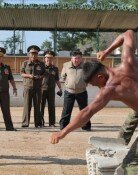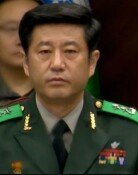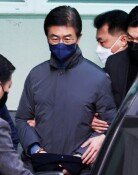Mentor fatigue
A group of mentors was formed on March 29 for the pan-opposition camp, comprising 12 people including Seoul National University law professor Cho Guk, writer Gong Ji-young, singer Lee Eun-mi and poet Kim Yong-taek. Most of the mentors had cultural and art backgrounds. The opposition camp created a pool of mentors for the Seoul mayoral by-election in October last year to encourage voting by those in their 20s and 30s. Left-leaning celebrities with many followers on social networking sites also asked voters to select the then opposition mayoral candidate Park Won-soon. Having benefited from the mentors, the opposition camp picked almost identical mentors for Wednesday`s general elections.
Loose-tongued mentors, however, seem to have grabbed the spotlight now for all the wrong reasons. Son Su-jo, a candidate of the ruling Saenuri Party, said she was spending her rent deposit of 30 million won (26,242 U.S. dollars) on her election campaign. When this claim turned out false, professor Cho said, She violated the Public Official Election Act. The National Election Commission, however, had another opinion after citing Supreme Court precedents. She did not violate the act because she simply announced her plan to finance funds for her campaign, the election watchdog said. This put Chos expertise into question. He sided with Democratic United Party candidate Kim Yong-min, who was maligned for using vulgar language. In explaining why he said former U.S. Secretary of State Condoleezza Rice should be raped and killed on a radio show, professor Cho said, "Kim was blasting sexual violence committed by American soldiers at the Guantanamo detention camp." But Kim never mentioned Guantanamo on the program.
Writer Gong Ji-young, another mentor, raised a big fuss after failing to discern fiction from non-fiction. She reposted on Twitter that the voting rate of residents in the affluent Tower Place surpassed 78 percent as of 2 p.m. Wednesday, but the rate was 54 percent as of 4 p.m. After much noise, mentor fatigue has surfaced. The mentors might think that young people will believe whatever they say and follow them, but many young adults are also capable of critical and independent thought.
A mentor refers to a counselor or adviser who can guide the younger generation, who has little worldly experience. Mentors should use the facts if they want to teach. Encouraging young voters to select the party the mentors support is different from faithful advice or care. The pan-opposition camp obviously was not as powerful as was expected given the ruling party`s upset win in the general elections. This is probably because the opposition camp relied on shallow public relation tools, instead of showing the contents and capabilities required for national administration.
Editorial Writer Hong Chan-sik (chansik@donga.com)
Headline News
- Pres. Yoon refuses impeachment documents for a week
- Debate over Lee’s participation causes friction in government consultative body
- Food and dining prices could increase en masse next year
- Foreign couple borrowed over $2 million to buy a Seoul house
- One-third of Japanese companies keep workers employed until 70






